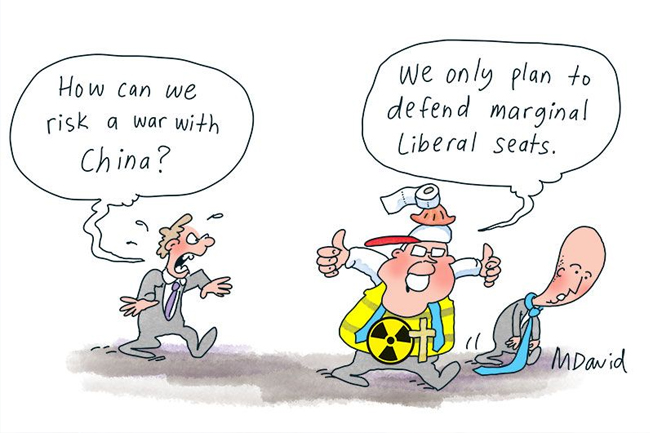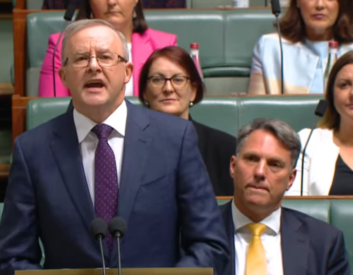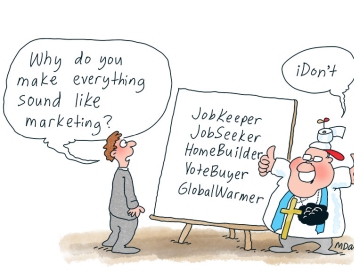Dr Geoff Davies analyses the factors leading to Brexit which amounted to a backlash against a history of inequality and disempowerment delivered by followers of Thatcher's economic rationalism, or today's neoliberalism.
SO YOU dispossess people by siphoning their income away and removing the supports they used to have. You alienate them by pursuing dreams of global power instead of local well being, and by telling them to stop feeling entitled to a share of the wealth. You disempower them by ignoring their wishes and governing for the rich. Are you then surprised if there is a backlash?
When people feel powerless they look for scapegoats. They turn against those who are different. They turn against foreigners. They turn against each other. And so you have xenophobia and racism. You have division and conflict in what was formerly a peaceful society. You have those who fan those feelings and ride them to power.
When people are afraid, they look for someone to make them feel safe. Enter the two-faced demagogues who, out of their back face, stoke the fear, and out of their front face promise to save us from the threatening demons.
If you keep doing all these things, then eventually people will lash back. There will come an occasion in which they feel they can vent their anger. They may not be very rational. They may hurt themselves even as they try to hurt their perceived tormentors.
Such a backlash has now happened, in Britain. It could have happened in Greece, crushed by the monumental arrogance and stupidity of the European monetary authorities. It could have happened in Spain, where unemployment has been almost as high, around 20 per cent, due to the same policies. It could have happened in the United States where the Tea-Party groundswell of anger has been growing for years and has propelled Donald Trump close to the Presidency.
What do these countries, and Australia, have in common? We have all suffered several decades’ policies that allow the rich and powerful to siphon much more than their fair share of wealth to themselves, and thus to gain and wield more power to further enhance their advantage.
The problems of inequality are not the tired cliches of envy and old-fashioned class warfare. The problems are that the excessively wealthy gain excessive power over the rest of us, and that most people get less than their fair share of the wealth that is generated within our highly interconnected society.
The wealthy play speculative games with their wealth. They have driven up the price of housing. Poorer people are priced out of housing through no fault of their own. If you can only afford to live in far-flung suburbs and can't afford a car you are seriously disadvantaged, even if the bean counters don't recognise your poverty. You feel invisible as well as powerless.
It is appropriate that the backlash has happened in Britain, because that is where the problem started. It started with the election of Maggie Thatcher in 1979, soon followed by Ronald Reagan in 1980, and then by many others. It was called economic rationalism and featured economic deregulation, especially of financial markets.
These days it is called market fundamentalism or neoliberalism. Whatever its name, and whatever vacuous justifications are advanced in its support, it increases the opportunities for the wealthy play their dodgy, unfair, unproductive games.
Despite non-stop propaganda hailing the allegedly great success of neoliberalism, it has never matched the performance of postwar social democracy. It also triggered the stock market crash of 1987, the currency meltdowns of the late 1990s, the dot-com boom and crash and then the Global Financial Crisis. It has hobbled the recovery from the GFC. It has kept the periphery of Europe in severe depression. Neoliberalism is a failure.
Read the more informed commentaries coming out of Britain and you will learn the roles of wealth and dispossession. One woman is quoted:
“If you have money you vote in, if you don't have money you vote out”.
The British Labour Party is complicit because under Tony Blair it joined the neoliberal bandwagon, trading its constituency’s interests for power. And where did Blair gain his inspiration? Why from none other than our own Paul Keating. He and Bob Hawke were among the first to take a mildly leftist party to the neoliberal right. Bill Clinton did the job in the United States.
Labour in the UK and here would better serve their constituents without their mercenary, careerist, out of touch Keating-Blair elite. Unfortunately Jeremy Corbyn has had little chance to reform UK Labour.
Also unfortunately the Conservative Party and Government may now be dominated by its reactionary, extremist right-wing.
We face the same obvious danger in Australia. There is no hint that Australian Labor will reform itself. It’s true that role is now being played by the Greens, but they are still a long way from power.
The historical truth and danger is that it is always easier for simplistic, fascist demagogues to seize power in troubled times than it is for those who see below the symptoms to the root cause of the problem: in this case the baseless, destructive neoliberal ideology.
Dr Geoff Davies is an author, commentator and scientist. He blogs at BetterNature (betternature.wordpress.com). He is also the author of Sack the Economists (Nov 2013, sacktheeconomists.com).

This work is licensed under a Creative Commons Attribution-NonCommercial-NoDerivs 3.0 Australia License
Monthly Donation
Single Donation
Make your voice heard. Subscribe to IA for just $5.









